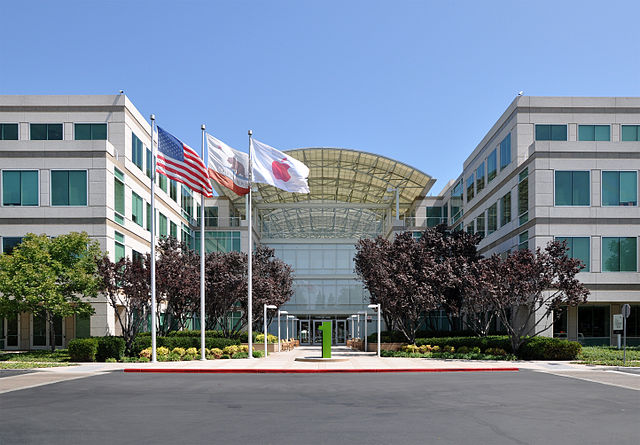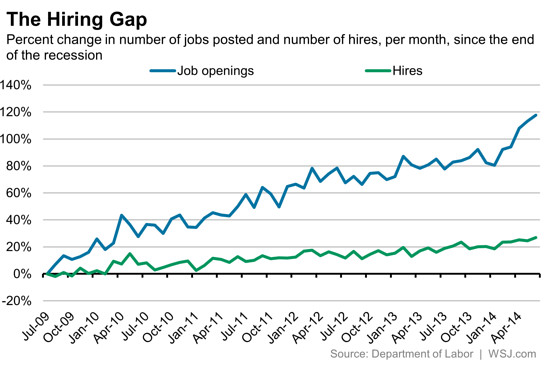It’s a super secret Apple product — incredibly polished, meticulously planned, and the result of a massive investment on the part of the company.
No, it’s not the latest yet-to-be-announced iPhone.
It’s Apple University, Apple’s internal training program that runs year-round, features courses created and taught by full-time faculty, and boasts as its dean Joel Podolny, the former dean of the Yale School of Management. “Even the toilet paper in the bathrooms is really nice,” one employee reported.
Apple University dwarfs what most companies offer their employees for internal training, and it shows in employee growth, retention, and fierce dedication to the company’s unique culture and vision. For Apple, it’s an essential investment in the people that make up the company and its future.
Unfortunately, this kind of people investment is all too rare today. According to ManpowerGroup, 36% of global employers report difficulty finding candidates with the higher-tech skills that the modern economy requires. Yet the blame, according to Professor Peter Cappelli of the Wharton School at the University of Pennsylvania, falls on employers for failing to training for employees on how to fill those higher-skilled roles — and that’s become a huge problem for companies and job-seekers alike.
The Skills Gap and the “Obvious” Solution
Starting at the end of the recession in mid-2009, job openings now far outpace the number of people being hired. As you might expect, employers put the blame on job candidates — the well-worn refrain is that candidates lack skills, experience and education. The phenomenon is called the “skills gap”.
That’s bunk, according to Professor Cappelli. The blame falls on employers, not candidates.
Reviewing a wide-range of purported supporting evidence for the “skills gap,” he found that there was “very little evidence consistent with the complaints about skills.” On the contrary, he found that candidates are over-educated and overqualified with respect to available job positions.
The root problem is actually that “employers are no longer willing to train their employees or raise salaries, and instead want to be able to hire people with exactly the right skills–and on the cheap.”
For jobs that require a specialized set of skills, there’s an “obvious solution,” as Cappelli put it bluntly. “Virtually all the skill problems reported by employers is to increase training and produce the skilled workers they want themselves.”
How Startups Can Pull off Internal Training
It’s easy for one of the most profitable companies in the history of the world to invest in its employees, but what about the rest of us?
For tech companies, one of the toughest challenges is hiring people who can code. But startups like Wistia have found a brilliant way around the seemingly-intractable world of hiring skilled software engineers — teach people how to code in-house.
Those who want to learn how to code get paired with a developer to meet up for weekly one-on-one hour-long lessons over a semester of about 4 to 5 months. Customer champions, for example, might learn Ruby on Rails, the programming language and framework that they use at Wistia, and Javascript.
Instead of culminating in a personal project or a thesis, they work on real-world problems, going straight from learning language theory to fixing actual bugs in the system.
Before learning to code, the customer champion might not be comfortable resolving technical issues, instead needing to file tickets and ask engineers for help. Afterwards, they’re empowered to find the root cause of problems and solve them.
The upshot is that instead of putting out a job listing for a software engineer that might languish in the scarce engineering job market, Wistia is able to hire someone who lacks skills but is technically-minded and eager to learn. It makes business sense and it reinforces Wistia’s cultural value of continuous improvement and learning.
Rather than bemoan the “skills gap” while doing nothing, Wistia serves as an example of how a startup can use internal training to grow the skilled team that it needs.
* * * * *
As Twitter’s engineering manager Rich Paret told us, the key to building the best companies isn’t about finding the people with perfect qualifications:
Attitude and aptitude are fundamental to your approach to work. Generally speaking these don’t change that much over time, whereas your skill set, especially considering engineers, is always changing. If we were just hiring based on the hottest skills, you might get the right person for your company but it’s really more of a gamble.
While investing in your business seems like a no-brainer, for some reason, organizations forget that its thanks to its business is made up of people in the first place. Investing in those people is the way to build for the future.
Liked this post? Subscribe to our free newsletter for more great content on productivity, management, and how to work better!



